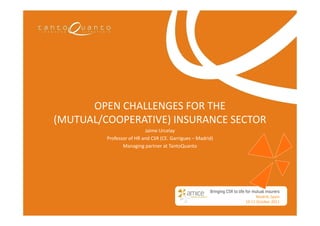Open challenges for the (mutual/cooperative) insurance sector
- 1. OPEN CHALLENGES FOR THE (MUTUAL/COOPERATIVE) INSURANCE SECTOR Jaime Urcelay Professor of HR and CSR (CE. Garrigues ¨C Madrid) Managing partner at TantoQuanto Madrid, Spain 10-11 October 2011
- 2. Consolidation and universalization of the CSR movement Changes in management and business models Financial crisis and collapse of trust 2
- 3. Consolidation and universalization of the CSR movement
- 4. Consolidation and universalization of the OVERVIEW CSR movement Paradoxes in the CSR movement. The CSR is no longer an exclusive approach of social economy companies. General acceptance of the link between CSR and business competitiveness and long-term sustainable development of our world. Consolidation of CSR good practice in all sectors and company sizes. Political momentum and stabilization and coordination of CSR standards and indicators. 4
- 5. Consolidation and universalization of the OPEN CHALLENGES CSR movement The CSR is inherent to mutuality. Taking care of the mutual / cooperative culture of our business as a differentiating advantage in the new environment. To value and develop CSR policies and practices: manage, measure and communicate ICMIF Report 6 key areas. Imperative of excellence in management for mutual / cooperative insurers. Quality / Efficiency operations to meet the first CSR condition: to be a good company. 5
- 6. Changes in management and business models
- 7. Changes in management and business models OVERVIEW 7
- 8. Changes in management 2. 1. Digital revolution and the and business models social networks ˇ°We are in a very, very primary state in digital revolution. We are overestimating the short term and underestimating the long-term. The long-term effect is that the digital revolution will change the governments and markets completely . The change will be so deep that we can not even imagine at the moment and this can happen in 50 years, I do not know when exactly. Joichi Ito, MIT Media Lab Director, El Pa¨Şs 10/07/2011
- 9. Fuente: ˇ°The Future of HR in Europe. Key challenges through 2015ˇ±, BCG/EAPM, s/f. and business models Changes in management 2. 2. ˇ°War for talentˇ±
- 10. Changes in management 2. 3. Customers and other and business models stakeholders in the Era of Collaboration Markets are conversations: customer intelligence, interaction, partnership, networksˇ Innovation comes mainly from abroad. The volatility of the environment requires an ability to adapt quickly: tailored offers and adapted to customers and segments, pricing policy, product development, new channels ... The new value of the brand reputation.
- 11. Changes in management 2. 4. The new management and business models 1. Ensure tha the work of management serves a higher purpose. 2. Fully embed the ideas of community and citizenship in management systems. 3. Reconstruct managementˇŻs philosophical foundations. 4. Eliminate the pathologies of formal hierarchy. 5. Reduce fear and increase trust.. 6. Reinvent the means of control. 7. Redefine the work of leadership.. 8. Expand and exploit diversity.. 9. Reinvent strategy making as an emergent process. 10. De-structure and disggregate the organization. Fuente: Gary Hamel, Moon Shots for Management, HBR, February 2009.
- 12. Changes in management OPEN CHALLENGES and business models Leading from the Culture and shared values. The human team as a priority. A new leadership style: open, participatory, distributedˇ service focused. Defining new models of relationships with stakeholders, integrated CSR approach. CSR as a platform for innovation. 12
- 13. Financial crisis and collapse of trust
- 14. Financial crisis and OVERVIEW collapse of trust Gaps and limitations of the current economic and business model. A loss of trust in the markets that fully affect the financial sector and, in some countries, insurances. The new emerging social values. Insurance, a key factor for the safety and welfare. Where are we at CSR, where are we going? 14
- 15. Financial crisis and OPEN CHALLENGES collapse of trust Our first responsibility is the human being and its dignity. No choice. Review the basics of CSR: ethical sense of economic activity. What is the purpose of our companies? Insurance companies: the need for a CSR focused in products, inserted into the value chain. The new role of mutual / cooperative insurance. 15
- 16. Consolidation and universalization of the CSR movement Changes in management and business models Financial crisis and collapse of trust 16
- 17. CONCLUSION The challenge of humanization of the economy makes mutual / cooperative model a paradigm of an integral culture of excellence, able to balance economic efficiency and social and environmental performance. 17
- 18. Thanks! 18
- 19. 19



















